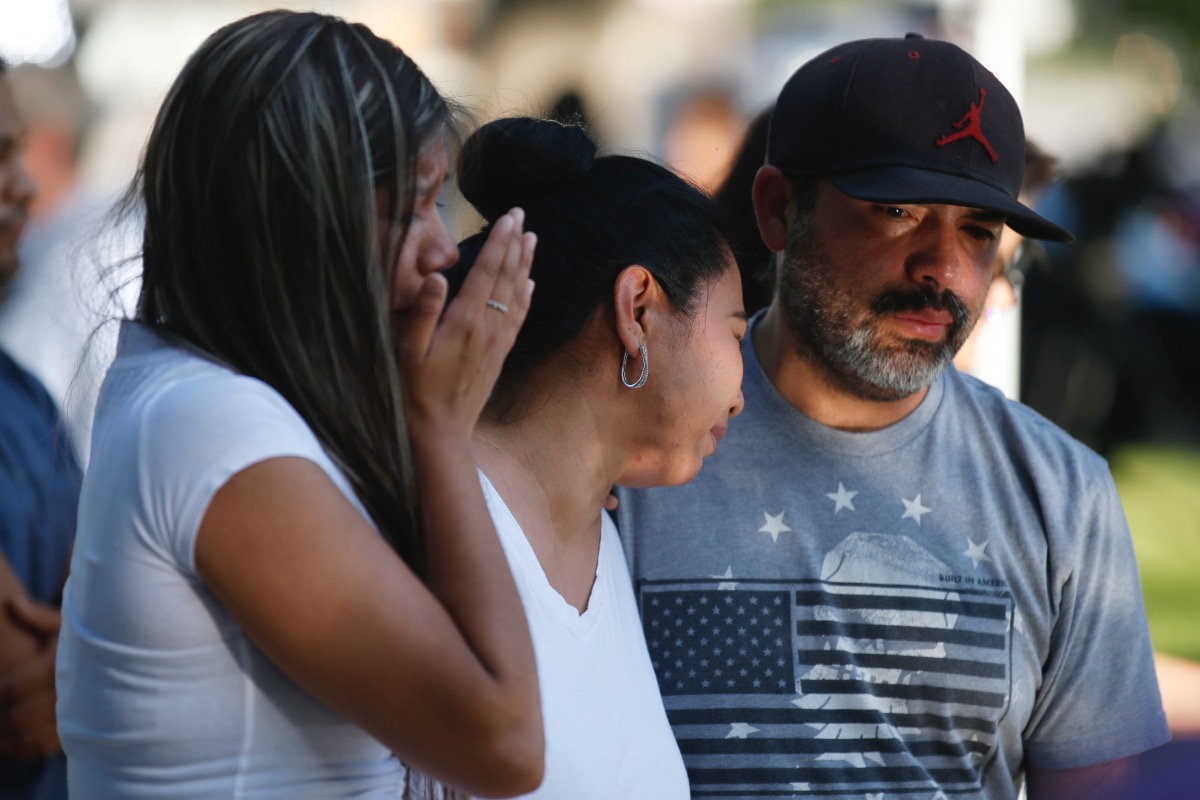

Mario Games, right, and his wife Marisela and daughter Emily react as they stand in front of a cross with the name of their niece, Nevaeh Bravo, at a memorial site for the victims killed in the elementary school shooting in Uvalde, Texas, Thursday, May 26, 2022. (AP Photo/Dario Lopez-Mills)
By BRYANT SILVA and CHRISTINA T. SAENZ
When the news broke about another mass shooting claiming the lives of students and teachers at Robb Elementary School in Uvalde, Texas, the nation was gripped by another massacre of another community of color, coming months after the horrific, white supremacist attack in Buffalo, New York.
As NGO professionals working on Amnesty International USA’s End Gun Violence campaign, we were still in organizational response mode to Buffalo.
While both massacres shook us to our core as people of color, we both felt the Uvalde tragedy in a unique way. These Brown children and their Latinx community with their Spanish last names seemed like members of each of our own families.
The post-mass shooting cycle of Uvalde stuck to the usual script. Anti-gun violence activists reemerged across media to argue the need for gun control—but they didn’t look like the children of Uvalde, their families, or their community.
For example, the Spanish names of the victims and others involved were mispronounced. Activists never acknowledged how Uvalde had the longest student walkout in U.S. history over an unjust educational system toward Chicanx students, and how the state police were deployed to squash the demonstrations.
Yet, they did know that it was the hometown of Matthew McConaughey.
Some even blamed undocumented people for the shooting. But most important, these media figures did not have an understanding of how a binational, bicultural border community of color had to endure yet another injustice.
To understand Uvalde as a community and the locus of a school shooting, we have to recognize the essence of borders. Borders —in both the territorial and identity sense— are in a constant state of violence and militarization, separating the U.S. from the rest of the world. The border communities along the Texas-Mexico border, near Uvalde, have a deep history of anti-Mexican violence dating back to the 1800s. Many of the perpetrators used guns to and in the lynching of Mexicans and Mexican Americans.
Latinx communities in the U.S. have always faced structural injustices, ranging from anti-immigrant initiatives, police brutality and surveillance, low-wage worker exploitation, and educational inequality. Latinx-centric organizing has primarily focused on such issues.
Now is the time for Latinx people to share the center in the movement to End Gun Violence!
In an August 2022 poll from UnidosUS and Mi Familia Vota, Latinx voters cited gun violence as a top concern for policy reform and the 2022 midterm elections. Since the start of the COVID-19 pandemic, gun violence has skyrocketed across all communities, but has impacted Black and Brown communities more. Latinx people in the United States have increasingly been targets of hate-based gun massacres, such as the 2019 El Paso massacre by a white gunman, or the 2016 Pulse nightclub killing of mostly Latinx gay men.
With gun violence becoming a top political issue for Latinx voters, and Latinx people in the U.S. dying from gun violence at a faster rate than their white peers, we need more Latinx faces organizing to end gun violence.
To help win the fight for ending gun violence, Amnesty International USA (AIUSA) is organizing a diverse block of activists from communities most impacted by gun violence.
Working in coalition with gun safety groups, AIUSA had some wins this year—such as banning ghost guns in Illinois and securing federal grant money for anti-gun violence, community-based organizations as part of the Bipartisan Safer Communities Act.
We need your help to continue organizing in your community, advocating for gun safety, and winning these battles at the state and local levels.
There is a percolation of hope amongst the confusion and trauma of Uvalde. Latinx activism is becoming centered within the anti-gun violence movement. Our burgeoning centrality within the movement will hopefully translate into gun laws that will be sensitive to the nuances of local communities.
We all have the right to live free of violence, even on the border.
***
Bryant Silva is an Ecuadorian American Digital Organizer at Amnesty International USA. Twitter: @Bryant__Silva
Christina T. Saenz is a Tejana data analyst at Amnesty International USA. Twitter: @dataluchadora



[…] post Centering Latinos in the Anti-Gun Violence Movement (OPINION) appeared first on Latino […]